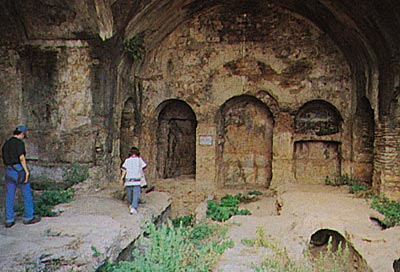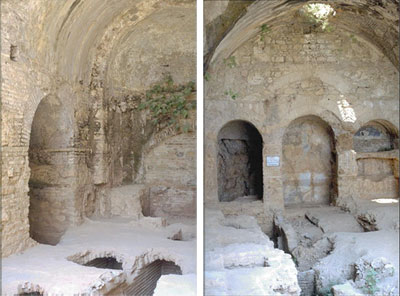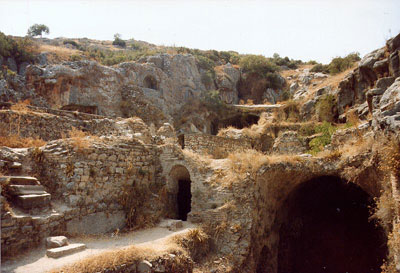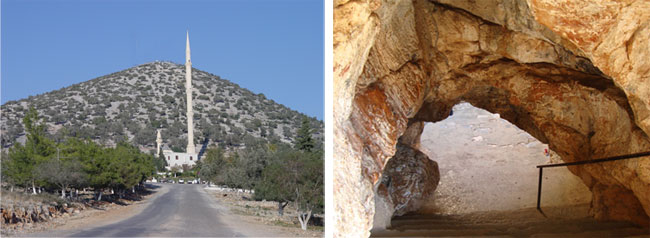Companions of the Cave
Or dost thou reflect that the Companions of the Cave and of the Inscription were wonders among Our Sign? (Surat al-Kahf: 9)
The eighteenth surah of the Qur’an, "Al-Kahf", or "the cave", tells about a group of young people who took shelter in a cave to hide away from a ruler who denied Allah and practised oppression and injustice upon the believers. The verses on the subject are as follows:
Or dost thou reflect that the Companions of the Cave and of the Inscription were wonders among Our Sign?
Behold, the youths betook themselves to the Cave: they said, "Our Lord! bestow on us Mercy from Thyself, and dispose of our affair for us in the right way!"
Then We draw (a veil) over their ears, for a number of years, in the Cave, (so that they heard not):
Then We roused them, in order to test which of the two parties was best at calculating the term of years they had tarried!
We relate to thee their story in truth: they were youths who believed in their Lord, and We advanced them in guidance:
We gave strength to their hearts: Behold, they stood up and said: "Our Lord is the Lord of the heavens and of the earth: never shall we call upon any god other than Him: if we did, we should indeed have uttered an enormity!
These our people have taken for worship gods other than Him: why do they not bring forward an authority clear (and convincing) for what they do? Who doth more wrong than such as invent a falsehood against Allah?"
"When ye turn away from them and the things they worship other than Allah, betake yourselves to the Cave: Your Lord will shower His mercies on you and disposes of your affair towards comfort and ease."
Thou wouldst have seen the sun, when it rose, declining to the right from their Cave, and when it set, turning away from them to the left, while they lay in the open space in the midst of the Cave. Such are among the Signs of Allah: He whom Allah guides is rightly guided; but he whom Allah leaves to stray -for him wilt thou find no protector to lead him to the Right Way.
Thou wouldst have deemed them awake, whilst they were asleep, and We turned them on their right and on their left sides: their dog stretching forth his two fore-legs on the threshold: if thou hadst come up on to them, thou wouldst have certainly turned back from them in flight, and wouldst certainly have been filled with terror of them.
Such (being their state), we raised them up (from sleep), that they might question each other. Said one of them, "How long have ye stayed (here)?" They said, "We have stayed (perhaps) a day, or part of a day. (At length)" they (all) said, "Allah (alone) knows best how long ye have stayed here? Now send ye then one of you with this money of yours to the town: let him find out which is the best food (to be had) and bring some to you, that (ye may) satisfy your hunger therewith: And let him behave with care and courtesy, and let him not inform any one about you.
For if they should come upon you, they would stone you or force you to return to their cult, and in that case ye would never attain prosperity."
 |
Thus did We make their case known to the people, that they might know that the promise of Allah is true, and that there can be no doubt about the Hour of Judgment. Behold, they dispute among themselves as to their affair. (Some) said, "Construct a building over them": Their Lord knows best about them: those who prevailed over their affair said, "Let us surely build a place of worship over them."
(Some) say they were three, the dog being the fourth among them; (others) say they were five, the dog being the sixth -doubtfully guessing at the unknown; (yet others) say they were seven, the dog being the eighth.
Say thou: "My Lord knoweth best their number; It is but few that know their (real case)." Enter not, therefore, into controversies concerning them, except on a matter that is clear, nor consult any of them about (the affair of) the Sleepers.
Nor say of anything, "I shall be sure to do so and so tomorrow"- without adding, "So please Allah!" and call thy Lord to mind when thou forgettest, and say, "I hope that my Lord will guide me ever closer (even) than this to the right road."
So they stayed in their Cave three hundred years, and (some) add nine (more) Say: "Allah knows best how long they stayed: with Him is (the knowledge of) the secrets of the heavens and the earth: how clearly He sees, how finely He hears (everything)! They have no protector other than Him; nor does He share His Command with any person whatsoever." (Surat al-Kahf: 9-26)
According to widespread belief, the Companions of the Cave who are praised both by Islamic and Christian sources, were subjected to the cruel tyranny of the Roman Emperor, Decius. Meeting the oppression and injustice of Decius, these young people warned their own people many times not to abandon the religion of Allah. The indifference of their people to their communication of the message, the increase in oppression of the emperor and their being threatened with death, caused them to leave their homes.
As historical documents verify, at that time, many emperors extensively executed policies of terror, oppression, and injustice on believers who stood for early Christianity in its original and pure form.
In a letter written by the Roman Governor Pilinius (69-113 AD) who was in North West Anatolia, to the Emperor Trayanus, he referred to "the companions of the Messiah (the Christians) who were punished because they resisted worshipping the statue of the Emperor." This letter is one of the important documents which relate the oppression visited on early Christians at that time. Under such circumstances, these young people, who were asked to submit to a non-religionist system and to worship an emperor as a god apart from Allah, did not accept this and said:
"... Our Lord is the Lord of the heavens and of the earth: never shall we call upon any god other than Him: if we did, we should indeed have uttered an enormity! These our people have taken for worship gods other than Him: why do they not bring forward an authority clear (and convincing) for what they do? Who doth more wrong than such as invent a falsehood against Allah?"(Surat al-Kahf: 14-15)
As regards the region where the Companions of the Cave lived, there are several different opinions. The most reasonable of these are Ephesus and Tarsus.
Almost all the Christian sources show Ephesus as the location of the Cave where these young believers took shelter. Some Muslim researchers and the Qur’anic commentators agree with the Christians regarding Ephesus. Some others explained that Ephesus could not be the place, and then tried to prove that the event took place in Tarsus. In this study, both of these alternatives will be dealt with. Yet, all those researchers and commentators - including the Christians - concur that the event took place at the time of Roman Emperor Decius (also called as Decianus), around 250 AD.
Decius, together with Nero, is known to be the Roman Emperor who most severely tortured the Christians. During his short reign, he passed a law that compelled everyone under his rule to offer a sacrifice to the Roman gods. Everyone was obliged to offer a sacrifice to these deities, and moreover, to get a certificate showing that they had done this, which they had to show to state officials. Those who did not obey were executed. In Christian sources, it is written that a great majority of the Christians refused this idolatrous act and fled from "one city to another", or hid in secret shelters. The Companions of the Cave are most probably a group among these early Christians.
Meanwhile, there is a point that has to be emphasised here: this topic has been narrated in a story-like manner by some of Muslim and Christian historians and commentators, and turned into a legend as a result of the addition of much falsehood and hearsay. However, this incident is a historical reality.
Are the Companions of the Cave in Ephesus?
 |
| The interior of the Cave in Ephesus which is thought to be one of the places where Companions of the Cave resided. |
As regards the city where these young people lived and the cave in which they took shelter, various places are indicated in different sources. The main reasons for this are: people's wish to believe that such courageous and brave-hearted people lived in their town, and the great similarity of the caves in those regions. For instance, in almost all of these places, there is a place of worship said to be built over caves.
As is well known, Ephesus was accepted to be a holy place by the Christians, because, there is a house in this city which was said to be the Virgin Mary's and which was later turned into a church. So, it is highly probable that the Companions of the Cave resided in one of those holy places. Moreover, some Christian sources state their certainty that it was the place.
The oldest source on the subject is the Syrian priest, James of Saruc (born 452 AD). The famous historian, Gibbon, has taken many quotations from James’ study, in his book The Decline and Fall of the Roman Empire. According to this book, the name of the Emperor, who tortured the seven young Christian believers and compelled them to hide away in a cave, was Decius. Decius ruled over the Roman Empire between 249-251 AD and his period of reign is widely known for the torments he practised on the followers of ‘Isa (Jesus). According to Muslim commentators, the region where the event took place was either "Aphesus" or "Aphesos". According to Gibbon, the name of this place is Ephesus. Situated on the western coast of Anatolia, this city was one of the largest ports and cities of the Roman Empire. The ruins of this city are known as "The Antique City of Ephesus" today.
The name of the Emperor who reigned in the period when the Companions of the Cave woke up from their long sleep, is Tezusius according to Muslim researchers, whereas it is Theodosius II according to Gibbons. This Emperor ruled between 408-450 AD, after the Roman Empire had converted to Christianity.
Referring to the verse below, in some commentaries it is said that the mouth of the cave looks towards the north, and hence the sunlight could not penetrate inside. Thus, someone passing by the cave would be unable to see inside. The verse of the Qur’an informs:
Thou wouldst have seen the sun, when it rose, declining to the right from their Cave, and when it set, turning away from them to the left, while they lay in the open space in the midst of the Cave. Such are among the Signs of Allah: He whom Allah guides is rightly guided; but he whom Allah leaves to stray,- for him wilt thou find no protector to lead him to the Right Way. (Surat al-Kahf: 17)
The archaeologist Dr. Musa Baran points to Ephesus as the place where this group of young believers lived, in his book named Ephesus, and he adds:
In the year 250 BC, seven young people living in Ephesus choose Christianity and reject idolatry. Trying to find a way out, these young people find a cave in the eastern slope of the Pion mountain. The Roman soldiers see this and build a wall to the entrance of the cave. 45
Today, it is acknowledged that over these old ruins and graves, many religious constructions are built. Excavations made by the Austrian Archaeological Institute in 1926, revealed that the ruins found on the eastern slope of the Pion mountain belonged to a construction built on behalf of the Companions of the Cave in the middle of the fifth century (during the rule of Theodosius II). 46
Are the Companions of the Cave in Tarsus?
 |
| The cave in Ephesus seen from the outside. |
The second place presented as a possibility for where the Companions of the Cave lived, is Tarsus. Indeed, there is a cave that is very similar to the one described in the Qur'an, which is located on a mountain known either as Encilus or Bencilus, to the north-west of Tarsus.
The idea that Tarsus is the correct location is the view of many Islamic scholars. One of the most important Qur’anic interpreters, at-Tabari specified the name of the mountain where the cave stood as "Bencilus" in his book named Tarikh al-Umam, and added that this mountain was in Tarsus. 47
Again, another famous commentator on the Qur’an, Muhammed Emin stated that the name of the mountain was "Pencilus" and that it was in Tarsus. The name that is pronounced as "Pencilus" may sometimes be pronounced as "Bencilus". According to him, the difference between the words is caused by different pronunciations of the letter "B" or by the loss of a letter from the original word which is called "historical word abrasion".48
Fakhruddin ar-Razi, another well known Qur'anic scholar, explains in his work that "even though this place is called Ephesus, the basic intention is to say Tarsus here, because Ephesus is just another name of Tarsus".49
In addition, in the commentaries of Qadi al-Baidawi and an-Nasafi, in the commentaries of al-Jalalayn and in at-Tibyan, in the commentaries of Elmali and Omar Nasuhi Bilmen, and many other scholars, this place is specified as "Tarsus". Besides, all of these commentators explain the sentence of the seventeenth verse, "the sun, when it rose declined to the right from their cave, and when it set, turned away from them to the left", by saying that the mouth of the cave in the mountain looked towards the north.50
 |
| The cave in Tarsus that is thought to belong to the Companions of the Cave. |
The residence of the Companions of the Cave was a subject of interest also at the time of the Ottoman Empire and some research was done on the subject. There is some correspondence and an exchange of information on the subject in the Ottoman Archives of the Prime Ministry. For instance, in a letter sent to the Treasury Superior of the Ottoman State by the local administration of Tarsus, there is a formal request and an attached message notifying of their demand to give salary to those people who dealt with the cleaning and maintenance of the cave of Ashab-ı Kahf (Companions of the Cave). The reply to this letter stated that in order for these salaries to be paid to the workers from the state treasury, it was necessary to find out whether this was indeed the place where the Companions of the Cave had resided. The research made for this purpose has been very useful in determining the real location of the Cave.
In a report prepared after an investigation made by the National Council, it was stated: "To the north of Tarsus, a province of Adana, there is a cave on a mountain two hours away from Tarsus, and the mouth of this cave looks to the north as stated in the Qur'an."51
The debates which developed as to who the Companions of the Cave were, where and when they lived, has always led the authorities to research into the subject and many comments were made on the subject. Yet, none of these comments may be considered certain, and, therefore, questions such as: at which period these young believers lived, and where the cave mentioned in the verses was, remain without substantial answers.
Footnotes
45 Musa Baran, Efes, pp.23-24.
46 L.Massignon, Opera Minora, v.III, pp.104-108.
50 From the commentaries of Qadi al-Baidawi, an-Nasafi, al-Jalalayn and at-Tibyan, also Elmalili, Nasuhi Bilmen. 
51 Ahmet Akgündüz, Tarsus ve Tarihi ve Ashab-i Kehf. (Ahmet Akgündüz, Tarsus and History and the Companions of the Cave.)
- Preface
- Introduction: Past Generations
- Prophet Nuh (as) and The Great Flood
- The Prophet Ibrahim (as) Life
- The people of Prophet Lut (as) and The City which was Turned Upside Down
- The People of 'Ad and Ubar, The Atlantis of the Sands
- Thamud
- Fir'awn Who Was Drowned
- The People of Saba and the Arim Flood
- The Prophet Sulayman (as) and The Queen of Saba
- Companions of the Cave
- Conclusion
